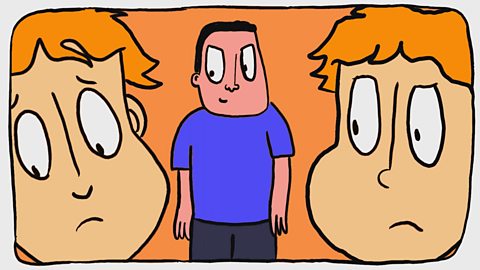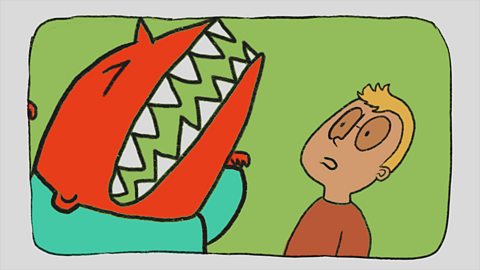TEGAN: I just love my life when people leave me alone. The pandemic was OK, really. Didn't want to go to school anyway. Then I couldn't go. And now I don't go - at all if I can help it.
POET: The pandemic was a moment in time,
and for you, you act like it was fine
to lock yourself away and say it was OK
to spend all day in a digital world
and just play,
forgetting there's an entire world
right outside -
in nature and reality
and friendships, adventures
and similarities.
TEGAN: I love this room. It's great. It's warm, quiet. I draw the curtains and the only light in the room is on the screen. I don't really know anybody since moving to secondary. Just saying the word "school" makes my heart race.
MUM: Tegan, you ready to go?
TEGAN: Oh, here we go. Same thing every morning. Mum, I'm ill!
MUM: But you have to go, Tegan. You can't stay here by yourself all day.
TEGAN: Oh, I can. And I'm going to. I'm safe here. I'm not on my own. Peaches, she just…smiles. She's always the same.
POET: There's laughter, there's tears.
There's overcoming your fears.
There's adventures to be had.
There's memories to be made.
There's a whole universe
waiting for you to pave.
TEGAN: Leave me alone. I've had a gutsful of everybody trying to help me.
MUM: I've got to go now, Tegan. Please, please. You've got half an hour. I'll call Mrs Thomas later on.
TEGAN: Mrs Thomas, the head. I can hear her voice now. I'm going to be sick. It's just too difficult out in the real world.
POET: Locking yourself away,
feeding your fears
is like giving nourishment
to your tears.
MUM: I'm off!
TEGAN: I do want to say that I'm coming with you.
POET: Every difficult decision
starts with a first step,
but you owe it to yourself
to take that first step.
Walk a different path.
Start a new adventure.
TEGAN: Breathing… In… and out. Maybe tomorrow. I'll just open the curtains.
Summary of the film
During the Covid-19 pandemic, Tegan spent most of her time playing computer games. By now, she prefers spending time with her computer game friends rather than going to school. Will Tegan manage to step out of her digital world and face the real world?
Teacher notes
Ideas for the classroom:
A game of bingo could be held in order to get to know new pupils in the class, if relevant. The aim of the activity would be to find out which pupil corresponds with the description, eg:
- the person with one brother and one sister
- someone who has been on a plane
- someone who likes bananas
and the first person to get five in row would win.
A rainbow of feelings – A short task could entail asking pupils to document how they’re feeling as they walk into the classroom. Pupils could be asked to collect their names which are on a piece of paper and place it on the rainbow chard which includes different feelings, eg happy, scared, shy, angry.
A group discussion could be held whilst showing a picture of two young people – one that’s playing computer games and one that's outside playing with friends – and pupils could place adjectives on both, eg isolated and sociable. This could lead to a discission about why pupils chose those specific adjectives.
A happy heart – The poem talks about “Locking yourself away feeding your fears” – teachers could discuss with pupils why the narrator says this, eg Tegan is missing out on making friends. This could lead to an activity asking pupils to fill a shape of a heart with drawings of what makes them happy.
Language, literacy and communication ideas:
- Advantages and disadvantages of using technology – Pupils could be encouraged to research into facts about the advantages and disadvantages of using technology, either by going online to find information or the teacher could provide articles and information sheets for the pupils.
Once they have found the information, pupils could be tasked with writing an opinion piece about the use of technology by following this structure:
- Introduction to the topic
- Explaining both sides of the argument
- Conclusion
And using phrases such as ‘In my opinion’ / ‘I agree’ / ‘I disagree’/ ‘On one hand… on the other’.
What does the future hold? Each pupil could think of something adventurous they would like to do in the future, eg visit Australia, climb Yr Wyddfa, go scuba diving. They could pick one and investigate which steps they would need to take to do this.
Pupils could be asked which adjectives and verbs the narrator uses throughout the poem, and work in partners or small groups to categorise them as ‘positive’ and ‘negative’ and place them in a table:
| Positive | Negative |
|---|---|
- Pupils could devise their own poems reflecting on a scenario/situation that makes them feel anxious whilst following the style of the poet. They could be encouraged to use repetition, lists, questions and adjectives in order for them to convey their feelings.
Learning outcomes and curriculum notes
Learn more about feeling isolated and dealing with changes – worried about returning to school, what will friends say, mixing with others etc
Learn about dealing with feelings of worry: what makes me feel worried, how do I feel when I’m worried, what makes me feel better
How we process and respond to our experiences affects our mental health and emotional well-being.
Area of Learning and Experience – Health and Well-being
Progression Step 3
I can see the benefits of communicating about feelings as one of a range of strategies which can help promote positive mental health and emotional well-being.
I can reflect on the way that past events and experiences have affected my thoughts, feelings and actions.
I can anticipate how future events may make me and others feel.
I can understand how and why experiences affect me and others
Our decision-making impacts on the quality of our lives and the lives of others.
Progression Step 3
I can recognise that some decisions I make will have a long-term impact on my life and the lives of others.
I can understand that decisions can be made individually and collectively, and that they can be influenced by a range of factors.
Healthy relationships are fundamental to our well-being.
Progression Step 3
- I can communicate my needs and feelings, and respond to those of others.
Area of Learning and Experience – Expressive Arts
Creating combines skills and knowledge, drawing on the senses, inspiration and imagination.
Progression Step 2
- I can communicate ideas, feelings and memories for an audience and for purposes and outcomes in my creative work.
Area of Learning and Experience – Languages, Literacy and Communication
Expressing ourselves through languages is key to communication.
Progression Step 1
- I can communicate by making marks, drawing symbols or writing letters and words in a range of contexts.
Progression Step 3
- I can adapt and manipulate language and make appropriate choices about vocabulary, idiomatic language and syntax in order to express myself with fluency and clarity.
Where next?
Trystan and Macs' story. video
Trystan and his brother Macs are being bullied in school, but don't tell anyone. Will they let the bullys get the better of them, or decided to talk to someone?

Tyler’s story. video
Tyler gets angry at the smallest thing and loses his temper easily. Will he be able to control his anger and talk about his emotions?

Will’s story. video
Will tries to help his family's financial situation and decides to steal money. Will be regret doing this and try to think of other ways to help?

